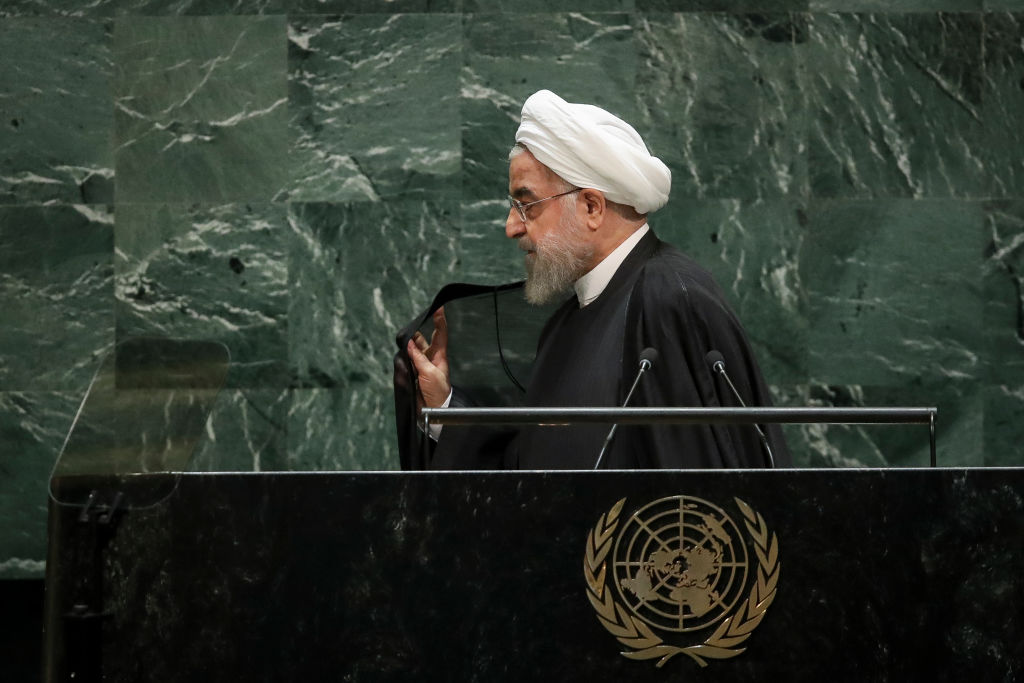Iran has started to re-open government offices, businesses despite coronavirus


A free daily email with the biggest news stories of the day – and the best features from TheWeek.com
You are now subscribed
Your newsletter sign-up was successful
Iran, which has experienced the worst novel COVID-19 coronavirus outbreak in the Middle East, began easing restrictions Saturday after a nationwide lockdown was put in place following the end of the Nowruz Holiday on April 4.
Government offices outside Tehran re-opened, and two-thirds of employees went into work, while the rest remained remote. Women with young children were reportedly given priority to work at home if necessary. Businesses in Tehran will be allowed to open next Saturday, so long as they register with authorities and adhere to social distancing guidelines. The government reportedly expects to be dealing with the virus in some capacity until the fall.
Iran has confirmed more than 70,000 cases and 4,300 people, including senior Iranian officials, have died of the disease, although some observers have questioned both totals. Regardless, the government tried to resist wide-scale shutdowns, arguing quarantines could be devastating economically considering the country is already under the strain of U.S. sanctions put in place after the Trump administration withdraw from the 2015 nuclear deal. Washington has offered humanitarian aid to help Iran fight the virus, but Tehran turned it down as part of an all or nothing approach when it comes to sanctions. Read more from The Associated Press.
The Week
Escape your echo chamber. Get the facts behind the news, plus analysis from multiple perspectives.

Sign up for The Week's Free Newsletters
From our morning news briefing to a weekly Good News Newsletter, get the best of The Week delivered directly to your inbox.
From our morning news briefing to a weekly Good News Newsletter, get the best of The Week delivered directly to your inbox.
A free daily email with the biggest news stories of the day – and the best features from TheWeek.com
Tim is a staff writer at The Week and has contributed to Bedford and Bowery and The New York Transatlantic. He is a graduate of Occidental College and NYU's journalism school. Tim enjoys writing about baseball, Europe, and extinct megafauna. He lives in New York City.
-
 Rubio boosts Orbán ahead of Hungary election
Rubio boosts Orbán ahead of Hungary electionSpeed Read Far-right nationalist Prime Minister Viktor Orbán is facing a tough re-election fight after many years in power
-
 Hyatt chair joins growing list of Epstein files losers
Hyatt chair joins growing list of Epstein files losersSpeed Read Thomas Pritzker stepped down as executive chair of the Hyatt Hotels Corporation over his ties with Jeffrey Epstein and Ghislaine Maxwell
-
 Political cartoons for February 17
Political cartoons for February 17Cartoons Tuesday’s political cartoons include a refreshing spritz of Pam, winter events, and more
-
 TikTok secures deal to remain in US
TikTok secures deal to remain in USSpeed Read ByteDance will form a US version of the popular video-sharing platform
-
 Unemployment rate ticks up amid fall job losses
Unemployment rate ticks up amid fall job lossesSpeed Read Data released by the Commerce Department indicates ‘one of the weakest American labor markets in years’
-
 US mints final penny after 232-year run
US mints final penny after 232-year runSpeed Read Production of the one-cent coin has ended
-
 Warner Bros. explores sale amid Paramount bids
Warner Bros. explores sale amid Paramount bidsSpeed Read The media giant, home to HBO and DC Studios, has received interest from multiple buying parties
-
 Gold tops $4K per ounce, signaling financial unease
Gold tops $4K per ounce, signaling financial uneaseSpeed Read Investors are worried about President Donald Trump’s trade war
-
 Electronic Arts to go private in record $55B deal
Electronic Arts to go private in record $55B dealspeed read The video game giant is behind ‘The Sims’ and ‘Madden NFL’
-
 New York court tosses Trump's $500M fraud fine
New York court tosses Trump's $500M fraud fineSpeed Read A divided appeals court threw out a hefty penalty against President Trump for fraudulently inflating his wealth
-
 Trump said to seek government stake in Intel
Trump said to seek government stake in IntelSpeed Read The president and Intel CEO Lip-Bu Tan reportedly discussed the proposal at a recent meeting
